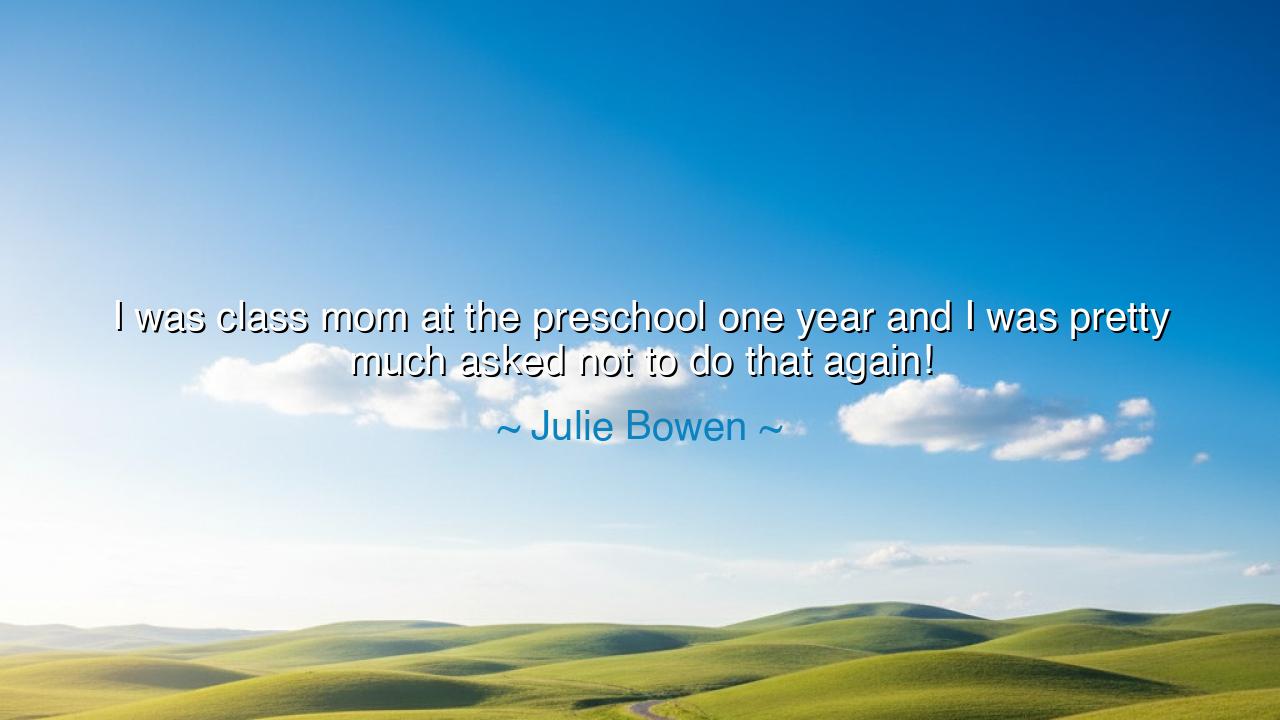
I was class mom at the preschool one year and I was pretty much
I was class mom at the preschool one year and I was pretty much asked not to do that again!






When Julie Bowen said, “I was class mom at the preschool one year and I was pretty much asked not to do that again!” her words, laced with humor, conceal a quiet depth of truth about imperfection, self-awareness, and the humble art of knowing one’s place in the larger dance of life. Beneath the laughter lies a universal experience — that moment when our enthusiasm outpaces our grace, when our good intentions meet the limits of circumstance, and we are gently — or not so gently — reminded that even the most devoted heart must learn to laugh at itself.
In the ancient tradition of wisdom, such moments were seen not as failures, but as initiations — the small, humbling trials through which the soul gains perspective. Bowen’s story may seem lighthearted, but its roots are ancient: she speaks of the eternal tension between intention and outcome. The “class mom” represents the archetype of service — one who wishes to give, to organize, to contribute. Yet the world does not always receive such offerings as we expect. The laughter that follows her admission is the laughter of recognition: every human being, at some point, has given their best and been told, in one way or another, “perhaps not again.”
There is great wisdom in her tone. Rather than bitterness, she chooses humor — and in doing so, transforms what could have been embarrassment into enlightenment. The ancients often taught that laughter is the highest form of humility, the moment when pride dissolves and truth is embraced with grace. To laugh at oneself is to say: I tried, I erred, and yet I remain whole. This is not the laughter of mockery, but of liberation. Through self-acceptance, even our missteps become sacred teachers.
History offers many examples of such transformation. Consider Socrates, who was mocked and misunderstood in his time, called foolish by those who could not grasp his wisdom. Yet Socrates laughed at his own ignorance, calling himself the wisest of men because he “knew that he knew nothing.” In that humility, he found freedom. So too does Julie Bowen’s humor reflect this ancient truth — that wisdom begins not with perfection, but with the courage to see ourselves clearly, to admit when our efforts go awry, and to meet that truth with a smile instead of shame.
Her quote also speaks to the complex nature of parenthood, particularly the modern mother’s struggle to balance responsibility, enthusiasm, and imperfection. The “class mom” role is symbolic — it represents not only a place within a community but also the internal drive to be good, to be helpful, to belong. To be “asked not to do that again” is not merely a critique; it is life’s gentle reminder that we need not excel in every role. Some seasons ask us to lead; others ask us to step back and laugh. Bowen’s humility in sharing the story is an offering to all who have ever tried too hard, cared too deeply, or stumbled while meaning well.
From her words emerges a timeless lesson of balance: that eagerness must be tempered with awareness, and that love, though fervent, must learn to breathe. In every human effort, there is a rhythm — moments to give, and moments to release. When we overreach, life redirects us, not out of cruelty, but to remind us that harmony is found not in control, but in surrender. Bowen’s experience as the “class mom” becomes a metaphor for the countless times we overstep out of love and must learn the art of letting go with grace.
So, let this teaching be remembered: do not fear your missteps — cherish them. When the world says “not again,” hear instead, “not now.” Every stumble is a lesson in proportion, every awkward moment a mirror showing us our humanity. Laugh at yourself, as Julie Bowen did, and walk forward wiser, lighter, freer. For those who can smile at their imperfections are the ones who move through life with peace, unburdened by the weight of pride.
And thus, her playful confession becomes a profound reminder to future generations: the road to wisdom is paved not with flawless successes, but with cheerful humility. Serve when called, withdraw when needed, and in all things, keep the heart light. For those who can laugh kindly at their own folly have mastered one of life’s greatest arts — the art of being human.






AAdministratorAdministrator
Welcome, honored guests. Please leave a comment, we will respond soon